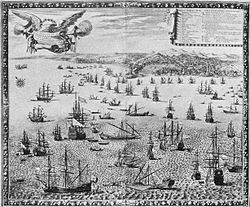1684
Lua error in package.lua at line 80: module 'Module:Ancient Olympiads' not found.
| Millennium: | 2nd millennium |
|---|---|
| Centuries: | 16th century – 17th century – 18th century |
| Decades: | 1650s 1660s 1670s – 1680s – 1690s 1700s 1710s |
| Years: | 1681 1682 1683 – 1684 – 1685 1686 1687 |
| 1684 by topic |
|---|
| Arts, history, and science |
| Countries |
|
|
| Lists of leaders |
| Birth and death categories |
| Establishments and disestablishments categories |
| Works category |
| Wikimedia Commons has media related to Lua error in Module:Commons_link at line 62: attempt to index field 'wikibase' (a nil value).. |
1684 (MDCLXXXIV) was a leap year starting on Saturday of the Gregorian calendar and a leap year starting on Tuesday of the Julian calendar, the 1684th year of the Common Era (CE) and Anno Domini (AD) designations, the 684th year of the 2nd millennium, the 84th year of the 17th century, and the 5th year of the 1680s decade. As of the start of 1684, the Gregorian calendar was 10 days ahead of the Julian calendar, which remained in localized use until 1923.
Events
- July 24 – René-Robert Cavelier, Sieur de La Salle sails from France, again, with a large expedition designed to establish a French colony on the Gulf of Mexico, at the mouth of the Mississippi River.
- October 7 – Japanese Chief Minister Hotta Masatoshi is assassinated, leaving Shogun Tsunayoshi without any adequate advisors, leading him to issue impractical edicts and create hardships for the Japanese people.
- December 10 – Isaac Newton's derivation of Kepler's laws from his theory of gravity, contained in the paper De motu corporum in gyrum, is read to the Royal Society by Edmund Halley.
Undated
- France under Louis XIV makes Truce of Ratisbon separately with the Holy Roman Empire (Habsburg) and Spain.
- Pope Innocent XI forms a Holy League with the Habsburg Empire, Venice and Poland to liberate Europe from the Ottoman Turkish rule.
- The Japanese poet Saikaku composes 23,500 verses in 24 hours at the Sumiyoshi Shrine at Osaka; the scribes cannot keep pace with his dictation and just count the verses.
- The British East India Company receives Chinese permission to build a trading station at Canton. Tea sells in Europe for less than a shilling a pound, but the import duty of 5 shillings makes it too expensive for most English people to afford.
- Smuggled tea is drunk much more than legally imported tea.
- England has its coldest winter in living memory; the River Thames and the sea as far as 2 miles out from land freezes over.
- John Bunyan writes The Pilgrim's Progress Part 2.
- The Chipperfield's Circus dynasty begins when James Chipperfield introduces performing animals to England at the River Thames frost fairs on the Thames in London.
Births
- January 1 – Arnold Drakenborch, Dutch classical scholar (died 1748)
- January 14 – Jean-Baptiste van Loo, French painter (died 1745)
- February 24 – Matthias Braun, Czech sculptor (died 1738)
- March 15 – Francesco Durante, Italian composer (died 1755)
- March 19 – Jean Astruc, French physician and scholar (died 1766)
- April 15 – Catherine I of Russia (died 1727)
- June 22 – Francesco Manfredini, Italian composer (died 1762)
- September 18 – Johann Gottfried Walther, German music theorist, organist, and composer (died 1748)
- October 10 – Antoine Watteau, French painter (died 1721)
- October 26 – Kurt Christoph Graf von Schwerin, Prussian field marshal (died 1757)
- December 3 – Ludvig Holberg, Norwegian historian and writer (died 1754)
Deaths
- April 1 – Roger Williams, English theologian and colonist (born 1603)
- April 5 – Lord William Brouncker, English mathematician (born 1602)
- May 4 – John Nevison, English highwayman (born 1639)
- May 12 – Edme Mariotte, French physicist and priest (born c.1620)
- July 2 – John Rogers, American President of Harvard University (born 1630)
- July 6 – Peter Gunning, English royalist churchman (born 1614)
- August 8 – George Booth, 1st Baron Delamer (born 1622)
- October 1 – Pierre Corneille, French playwright (born 1606)
- October 11 – James Tuchet, 3rd Earl of Castlehaven (born 1617)
1684 Media
August 7: Morean War: The Republic of Venice begins the bombardment the Ottoman Empire fortress on the island of Lefkada.
May 18: French Navy begins the Bombardment of Genoa and destroys most of the city in 10 days.





